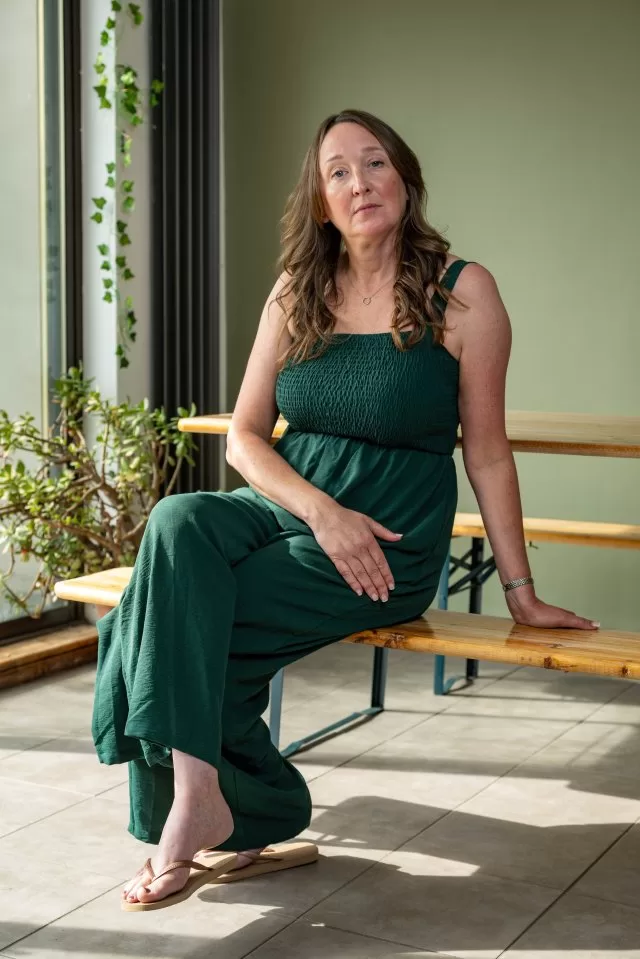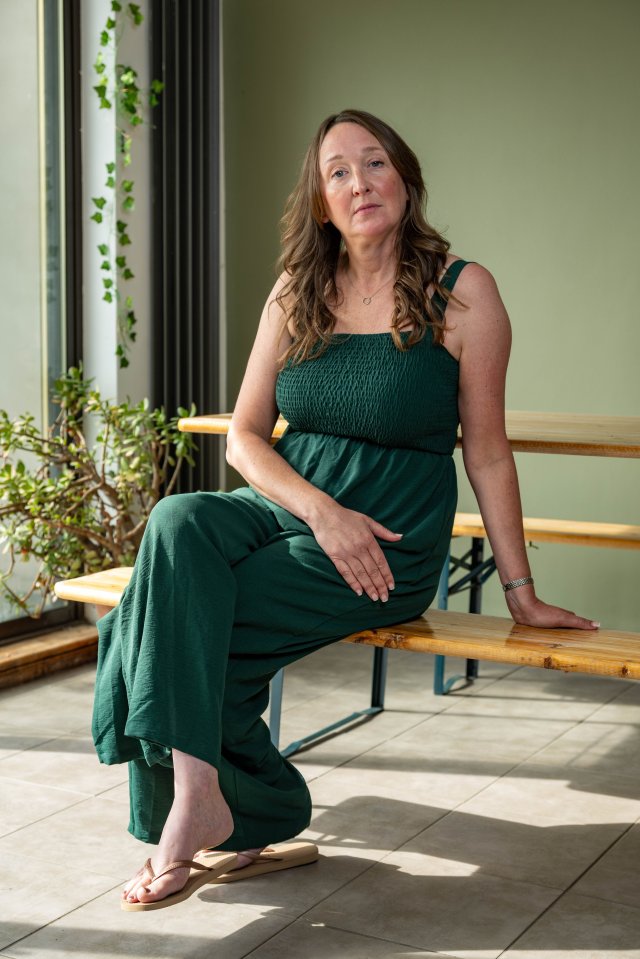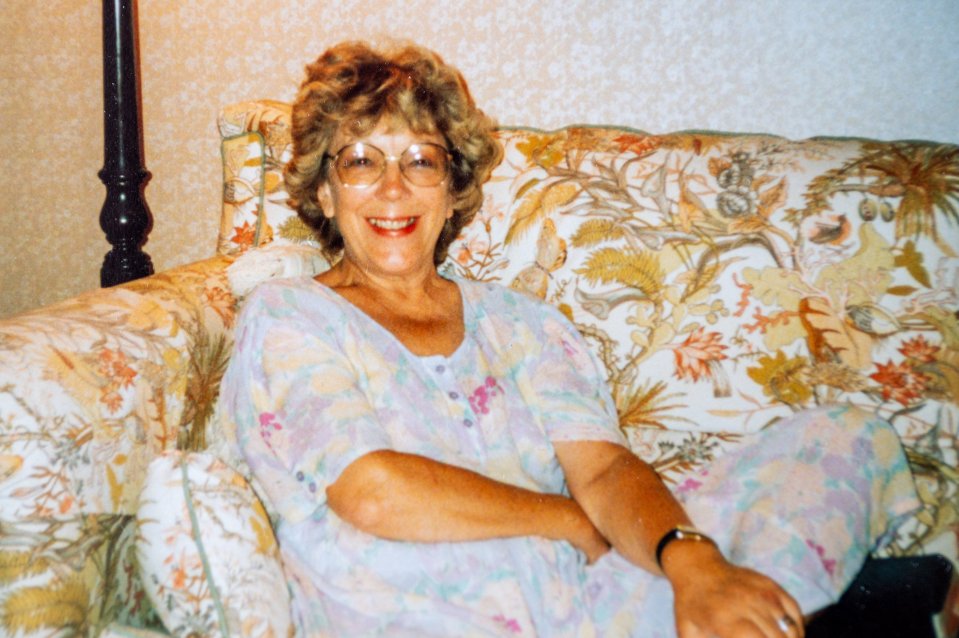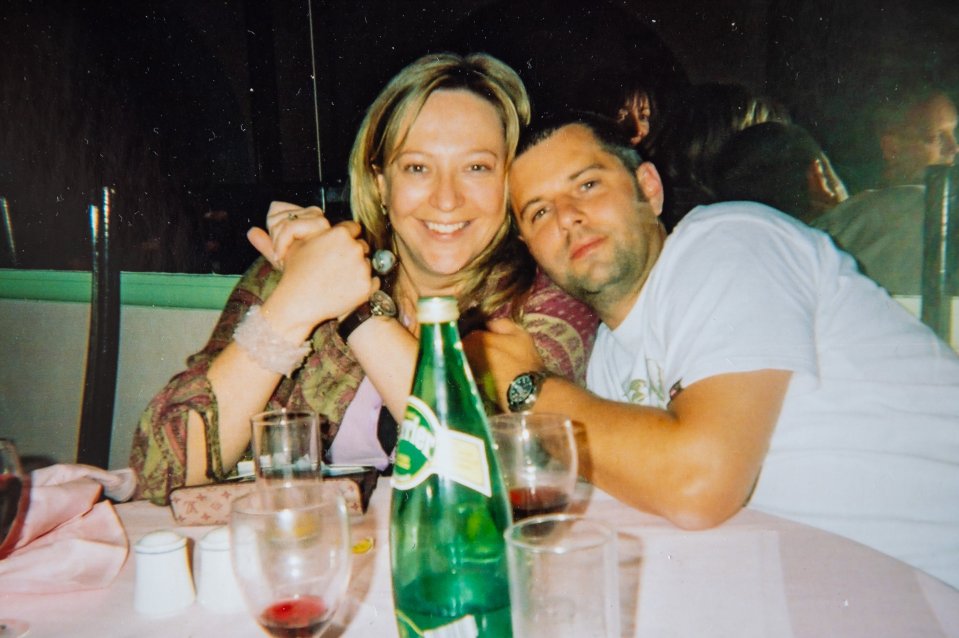SITTING on the pew in front of her late mother’s coffin, Olivia Wright felt angry on her behalf.
Her older sister Emma Parfrement had turned up at the last minute, dressed in a less-than-sombre outfit of metallic cowboy boots, pink trousers and a fluffy top.
“It was ridiculous,” recalls Olivia, 49, from Upminster, Essex.
“She sat at the back bawling her eyes out with a friend and then disappeared straight after the service, without attending the wake I’d organised and paid for.
“Dressing like that for your own mum’s funeral spoke volumes to me.”
But Emma’s behaviour in the years prior to Angela Wright’s death in November 2019 had already rung alarm bells with her sister.
After being estranging from her relatives for four years, she suddenly returned to the fold when Olivia informed her Angela had dementia.
She quickly secured sole power of attorney and put her mum in a care home.
She used this unfettered access to quietly siphon off the widow’s life savings, blowing it on a Porsche and allowing her ex-husband, Neil, to make risky investments.
Her actions left Olivia without a penny of inheritance and led to a costly four-year court battle to get to the truth.
While her sister’s actions were brazen, disputes over wills are increasingly common, with an estimated 10,000 per year in England and Wales.
Specialist solicitors say the passing of the property-rich boomer generation and a rise in dementia diagnoses are fuelling the financially ruinous and emotionally exhausting legal battles.
‘Been to hell and back’
“I believed her intentions were dishonourable even before Mum died but no one wanted to listen,” says Olivia, a special needs teacher who is married to carpenter Kirk, 60
“I’ve been to hell and back fighting for justice, spending all my savings. But I don’t expect to get a penny back — it’s all gone.
“If she’d stolen that money from a shop or a business, she’d be in prison. It’s not right.”
The warring sisters grew up in Chipstead, Surrey, and their parents, Norman — who died in 2004 aged 74 — and Angela, worked hard to give them a good life.
“Emma was three-and-a-half years older and we were very different,” Olivia says “I always felt she was embarrassed by me as a child.
“We got on better in our twenties and socialised together with our partners. Her then husband Neil was houseproud, the type to follow you round with a dust buster.
“They sent their kids to private school and had the best of everything. I felt like they looked down at me because I earned less and lived in a semi-detached house.”
Out of the blue in 2013, Olivia received a shock email from Emma, cutting all contact.
If she’d stolen that money from a shop or a business, she’d be in prison. It’s not right
“Emma and Mum always had a strained relationship, I think because they were quite similar,” she says. “Being the eldest, she was probably pushed harder to succeed.
“Emma decided she didn’t want to know Mum any more — and that meant me too.
“Mum turned up at her house a couple of times, desperate to see her grandsons, but Neil wouldn’t let her in. She was very upset.
“I’d had my daughter Elana, now 14, by that time and it hurt me that she couldn’t have a relationship with her cousins. But I respected Emma’s decision and life moved on.”
The rift continued until July 2017 when Olivia became concerned about their mother’s health and suspected she had dementia.
What is lasting power of attorney?
THIS is a way of giving someone you trust the legal authority to make decisions on your behalf if you are no longer able to.
There are two types – one for financial decisions and one for health and care – and you can set up lasting power of attorneys for both.
You can only create one if you have the mental capacity to do so and have not been put under pressure, but it is not necessarily permanent.
LPAs for health can only be used if you lose mental capacity, but financial ones can kick in sooner, if you prefer.
The system is overseen by the Office of the Public Guardian and you do not need a solicitor to draw one up.
Out of courtesy, she wrote to her estranged sister — who swooped in and took Angela to stay with her.
“Mum had been confused and paranoid for a few months, so the doctor had referred her to a memory clinic,” says Olivia.
“I was surprised when Emma said she wanted to help and give me a break.
“But she kept calling to say what a nightmare Mum was and then put her into a care home for four weeks’ respite. She never left.”
The home was near Emma and a two-hour round trip for Olivia, making it hard to visit.
“It all happened very quickly and in hindsight, I think she was keeping Mum close in order to manipulate things,” says Olivia.
“I suggested we get power of attorney but offered to do it alone if she didn’t want to be involved. Emma insisted it should be shared — then I got a letter to say it had been granted to her solely. I was furious.
“Why would you want to come back and manage someone’s finances if you’d cut them out for four years?
I had sleepless nights and times of pure anger
“I later found out she told people, including our mum’s financial advisor and care home staff, that I’d had a nervous breakdown. I think she was trying to paint a picture that she was the best person for the job.”
Olivia was assured by Emma that the care home fees were being covered by her mum’s savings.
But what she did not know is that her sister was also cashing in Angela’s ISAs and transferring large chunks of cash into her own current account, before giving the money to her now ex-husband to invest.
The former spouses had secretly drawn up an agreement that he would keep 50 per cent of any profits made.
Emma, 53, also sold Angela’s home, where the sisters had grown up, with Neil’s help, informing her sister by email.
“She treated me with such contempt, I had no say in anything,” says Olivia. “I was told to collect what I wanted and the rest would be disposed of.
“I didn’t want much, just my childhood things and the piano.” Within a year of going into care, Angela deteriorated so badly, she had to be moved to a secure dementia unit, before her death, aged 86.
To Olivia’s eternal regret, she arrived 15 minutes too late to say goodbye — and only Emma had been present.
“When she saw me come in, she looked flustered, gave me a hug and disappeared into the night,” she recalls. “I was very upset but she didn’t want to talk to me.”
The oddness continued as Olivia planned the funeral.
“We only had one phone conversation and Emma said: ‘I will pay for the funeral but I will not pay for a wake’.
“It was an odd choice of phrase because I expected Mum’s estate to cover it. This was not Emma’s money.
“In the end I paid for it and I wasn’t even sure if Emma would show up, until she appeared in her brightly coloured outfit.”
The situation soon started to unravel as Olivia pushed Emma about applying for probate — the legal right to manage someone’s property and possessions when they die — and her sister was evasive.
“I’d had my suspicions for a while and had already complained to the Office of the Public Guardian that her intentions were dishonourable regarding the power of attorney,” she says.
“They didn’t want to know and once Mum died, they said it was out of their hands.
“I sent Emma a letter by recorded delivery to find out what was going on. She returned it without accepting it. It set off alarm bells.”
I’ve had to put my grief to one side the last five years to fight this
Determined to right the wrong, Olivia launched a legal battle that would take four years, cost her £38,000 of her savings and even land her in hospital.
“We couldn’t find the will but luckily, I had a copy of our dad’s one that showed Mum made hers on the same day.
“The judge accepted that it would’ve been along the same lines and they were able to reconstruct it in February 2022.”
Finally, in July this year, Olivia faced down her sister and former brother-in-law at Central London County Court.
“I had sleepless nights and times of pure anger,” says Olivia.
“The day before the hearing, I was so unwell, I had to go to hospital and needed an MRI scan to rule out a mini stroke. Doctors suspected it was stress-related.”
After years demanding answers, Olivia felt vindicated when Judge Nigel Gerald ordered Emma and Neil to pay back £475,000 to the estate, plus around £200,000 interest.
‘Virtually no money left’
He said that, as a result of their reckless actions, there was “virtually no money left”.
Bank statements showed Emma had transferred nearly all the money to Neil, a former advertising agency boss, which he wasted on spread betting.
He returned around £144,000 to her but she splurged it on luxury items, including a Porsche 4×4. Despite the ruling, Olivia doubts she will see any compensation.
“Emma was living in a five-bedroom house in Surrey but is pleading poverty and claims she cannot pay,” she says.
“I only got to this stage because I had lawyers working pro bono to help. I’ve had to put my grief to one side the last five years to fight this. I haven’t even put Mum’s name on her gravestone yet.
“I still feel badly let down by the institutions that should have protected Mum.
“This wasn’t a fallout over the family silver. I feel like my mum’s memory and inheritance has been stolen from me, and my sister and her ex should face proper justice.”



